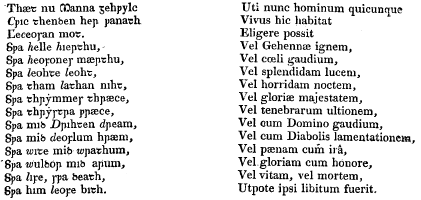No CrossRef data available.
Published online by Cambridge University Press: 24 July 2012
One of the Anglo-Saxon poems contained in the Exeter MS. is remarkable as being a translation or rather Paraphrase of a Latin Original still in existence; the “Phœnix” (attributed by some to Lactantius, and printed at the end of the Variorum Edition of Claudian) commencing
Est locus in primo felix Oriente remotus.
page 195 note * It will immediately be perceived that in this passage the Author has, besides the usual alliteration which is still carefully observed, adopted the additional ornament of rhyme, a circumstance of by no means common occurrence in A. S. Poetry. Mr. Turner has adduced a few examples of it, but I know of no source which would afford so many, or of such length, as the Exeter MS. The following occurs in the Poema de Die Judicii (mentioned by Wanley as part of its contents, beginning “![]() hce.”)
hce.”)

The latter part of the Volume contains one Poem entirely written in rhyme, with the alliteration also preserved throughout. Instances of the same kind occur in the Icelandic Poetry.
page 197 note b This was seldom directly the case with the poetry of the middle ages. The Boethius of Alfred is a splendid exception; and a singular one of later date (about 1200) occurs in the Digby MS. noticed by Warton (MS. Digb. 86). It is entitled “Le Regret de Maximien,” and appears to be an English translation from a French paraphrase (for it is too loose and inaccurate to be called strictly a version) of an Elegy by Maximianus, falsely attributed by its earlier editors to Cornelius Gallus.
page 197 note d It might perhaps be added that the concluding lines of the Poem are written alternately in Saxon and Latin (as may be seen by reference to Wanley's Catalogue). This may serve in part to determine the nature of the metrical system adopted by our ancestor a subject which, I trust, it will be in my power to illustrate in some future communication.